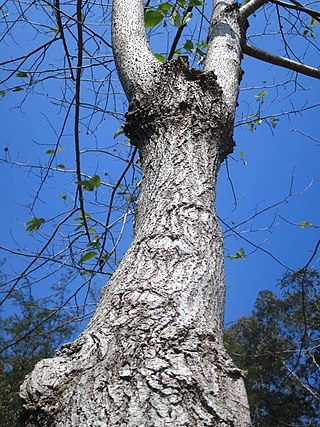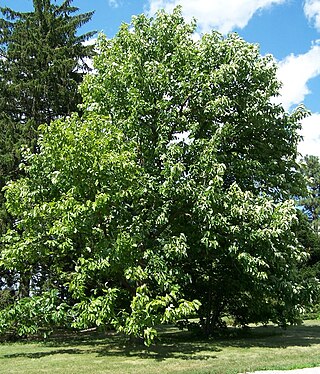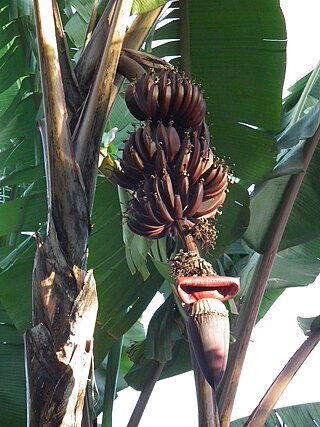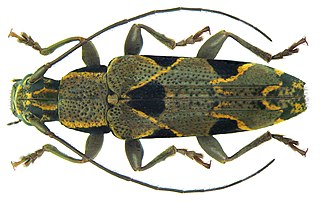
The sharp-tailed sandpiper is a small-medium migratory wader or shorebird, found mostly in Siberia during the summer breeding period and Australia for wintering.

Camptotheca is a genus of medium-sized deciduous trees growing to 20 metres (66 ft) tall, native to southern China and Tibet. The genus is usually included in the tupelo family Nyssaceae, but sometimes included in the dogwood family Cornaceae.

Magnolia acuminata, commonly called the cucumber tree, cucumber magnolia or blue magnolia, is one of the largest magnolias, and one of the cold-hardiest. It is a large forest tree of the Eastern United States and Southern Ontario in Canada. It is a tree that tends to occur singly as scattered specimens, rather than in groves.

Carpentaria acuminata, the sole species in the genus Carpentaria, is a palm native to tropical coastal regions in the north of Northern Territory, Australia.

Red bananas are a group of varieties of bananas with reddish-purple skin. Some are smaller and plumper than the common Cavendish banana, others much larger. Ripe, raw red bananas have a flesh that is creamy to light pink. They are also softer and sweeter than the yellow Cavendish varieties, some with a slight tangy raspberry flavor and others with an earthy one. Many red bananas are exported by producers in East Africa, Asia, South America, and the United Arab Emirates. They are a favorite in Central America, but are sold throughout the world.

Musa acuminata is a species of banana native to Southern Asia, its range comprising the Indian Subcontinent and Southeast Asia. Many of the modern edible dessert bananas are from this species, although some are hybrids with Musa balbisiana. First cultivated by humans around 8000 BCE, it is one of the early examples of domesticated plants.

Tmesisternini is a tribe of beetles in the subfamily Lamiinae containing the following genera:

Trigonoptera is a genus of longhorn beetles of the subfamily Lamiinae, containing the following species:
Trigonoptera cincta is a species of beetle in the family Cerambycidae. It was described by Judson Linsley Gressitt in 1984.
Trigonoptera sumptuosa is a species of beetle in the family Cerambycidae. It was described by Judson Linsley Gressitt in 1984.
Trigonoptera obscura is a species of beetle in the family Cerambycidae. It was described by E. Forrest Gilmour in 1949.

Trigonoptera transversefasciata is a species of beetle in the family Cerambycidae. It was described by E. Forrest Gilmour in 1949. It is known from Indonesia, and possibly Papua New Guinea.
Trigonoptera guttulata is a species of beetle in the family Cerambycidae. It was described by Gestro in 1876, originally under the genus Arsysia.

Trigonoptera spilonota is a species of beetle in the family Cerambycidae. It was described by Gestro in 1876, originally under the genus Arsysia. It is known from Papua New Guinea and Indonesia.
Trigonoptera gracilis is a species of beetle in the family Cerambycidae. It was described by Per Olof Christopher Aurivillius in 1917. It is known from Australia.
Trigonoptera sulcata is a species of beetle in the family Cerambycidae. It was described by Per Olof Christopher Aurivillius in 1924.
Trigonoptera sordida is a species of beetle in the family Cerambycidae. It was described by Francis Polkinghorne Pascoe in 1867.
Trigonoptera tesselata is a species of beetle in the family Cerambycidae. It was described by Francis Polkinghorne Pascoe in 1867, originally under the genus Arsysia.

Trigonoptera bimaculata is a species of beetle in the family Cerambycidae. It was described by James Thomson in 1865.









